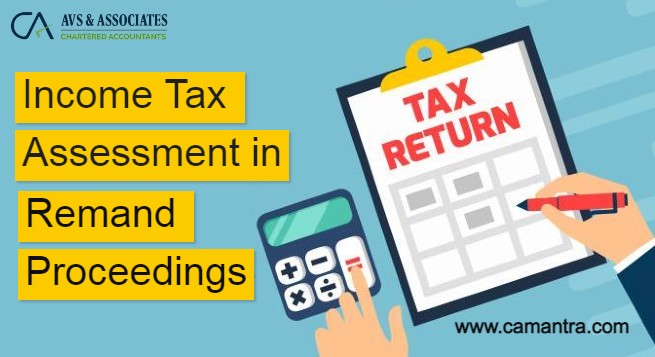The Income-tax (IT) department checks the return of income for its correctness. The procedure of reviewing the return of payment by the Income-tax department is known as assessment. The assessment also includes reassessment and judgment assessment u/s 144.
A reassessment proceeding is an essential provision under Income Tax Act. If an income which otherwise would have been taxable has due to some cause, has escaped assessment, for particular assessment year, then the proceedings undertaken by the assessing officer against the assessee are referred as reassessment proceedings.
Assessment In Remand Proceedings
The remand proceeding is an essential provision of the Income Tax Act. In other words assume that an income, which otherwise would have been chargeable to tax due to some reason, disappeared from assessment for a particular assessment year. The proceedings undertaken by the assessing officer against the assessee is referred as reassessment proceedings.
The authority to initializing reassessment proceedings has been given to the assessing officer under the Income-tax Act, 1961- section 147, which deals with the income escaping assessment. For making out a case for initiating a reassessment proceeding against the assessee, the assessing officer must comply with the four important conditions, as mentioned in section 147. These include: The four key essentials which makes or break a case for reassessment under section 147 includes:
- The reason to believe.
- Establishment of live link or nexus.
- Application of mind before recording reasons.
- Satisfaction of authority required under section 151 for issuance of notice under section 148 of the Act.
If the officer believes that some income has disappeared assessment, then the assessing officer ought to record the reason which led to the formulation of such a belief. Post documenting the reason and describing the link, the assessing officer will seek in writing important satisfaction from the authorities as defined in and mandated by section 151 of the Act if the reassessment is initiated after 4 years. After gaining the required sanctions u/s 151 of the income tax act, the assessing officer proposes a notice under section 148 of the Act to the assessee, thereby initiating a reassessment proceeding.
Across India, through many judgments courts have stated that the reasons jot down by the assessing officer in order to commence reassessment proceedings should be provided to the assessee along with the notice under 148 of the Act. However, the approach accepted by the revenue department is very different. Typically, a message under section 148 of the Act leads the outset of reassessment proceedings sent to the assessee without the causes recorded by the assessing officer. With the notice receipt under section 148 of the income tax act, the assessee can communicate to the assessing officer & examine a copy of the assessing officer’s reasons.
What are the Objections Raised By the Assessee?
The Supreme Court decides an appropriate procedure for the revenue and the assessee to be accompanied while dealing with the initialization of reassessment proceedings. An assessee may object to the causes structured by the assessing officer. The assessing office need to note these objections and have to dispose of the same before commencing reassessment by passing an order.
Hence, when a notice under section-148 is issued, the proper course of action is to file a return and seek reasons for issuing notices. These points must be noted concerning the supply of a copy of reasons:
- The assessing officer is compelled to furnish the reasons within a reasonable time.
- On receipt of reason, the notice is entitled to file objections to the issuance of the notice
- The assessing officer is compelled to dispose of the same by passing an order.
What are the Remedies Available to an Assesse?
If proper procedures are not followed while dealing with preliminary objections, in such cases, courts are being approached where the assessing officer passes an order without disposing of the initial objections raised by the assessee has provided advanage to the assessee by doing either of the following 2 things:
- Either the courts in some cases have given the order being passed by the assessing officer and remand back the matter to the assessing officer for fresh disposal of objections raised by the assessee, or
- In other cases, have the reassessment proceedings void ab initio by annihilating the issuance of notice u/s 148 for the initiation of reassessment proceedings.

